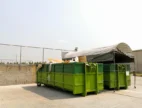Reusable Bags: Essential For Modern Retail
by Abdul Aziz Mondal Green Business Published on: 01 August 2023 Last Updated on: 17 October 2024

The retail industry has undergone a profound transformation, adapting to both consumer demands and environmental concerns. One of the emblematic symbols of this change is the rise of reusable bags. This shift away from single-use plastic bags towards more sustainable options has been both significant and necessary. In this comprehensive guide, we will explore why reusable bags have become essential for modern retail, outlining their impact on branding, customer engagement, environmental stewardship, and the broader B2B market.
Sustainability In Retail

Environmental Impact
The shift toward reusable bags in retail responds to the urgent need to reduce waste and carbon footprints. Plastic bags, though convenient, have a significant negative impact on the environment. Reusable bags, on the other hand, can be used multiple times, greatly reducing waste.
Regulatory Compliance
Many governments have introduced regulations banning or limiting the use of single-use plastic bags. Retailers have thus turned to reusable bags to comply with these laws, aligning their business practices with regulatory standards.
Branding Opportunities
Enhanced Brand Image

Reusable bags are not just functional; they serve as mobile advertisements for a brand. Custom-designed reusable bags allow retailers to create a positive brand image, linking their name with environmental responsibility.
Customer Loyalty
By offering reusable bags, retailers can foster a stronger connection with their customers. It’s an opportunity to engage customers with the brand, reinforcing loyalty and encouraging repeat business.
Reusable And Custom Bags In The B2B Market
Growing Demand In B2B
The rise of reusable bags has not only affected the B2C market but has also become a significant trend in the B2B arena. Businesses are increasingly looking for customizable and eco-friendly bag solutions that align with their brand values. For instance, suppliers like Ecoduka offer a wide range of reusable bags designed to meet various business requirements, allowing retailers to select styles that resonate with their brand and target audience.
Collaboration With Manufacturers
Retailers are often collaborating with manufacturers to design custom reusable bags. This partnership facilitates the creation of bags that serve as unique branding tools and align with a retailer’s specific marketing strategy.
Enhancing Customer Experience
Added Value For Customers

Reusable bags offer added value to customers by providing a sustainable and often stylish alternative to traditional bags. They contribute to a positive shopping experience and can even become a desired product themselves.
Incentive Programs
Some retailers have introduced incentive programs that reward customers for using reusable bags. These programs not only promote the use of reusable bags but also create a positive association with the retailer’s brand.
Challenges And Solutions
Educating Consumers
Despite the benefits, some consumers may still prefer single-use bags. Retailers must play a role in educating customers about the advantages of reusable bags and encouraging their adoption.
Quality Considerations
Quality is paramount when selecting reusable bags. Poorly made bags can lead to a negative customer experience. Retailers must ensure they source high-quality bags that align with their brand’s reputation.
Conclusion
Reusable bags are no longer a mere alternative in modern retail; they have become essential. From enhancing branding to fostering customer loyalty, complying with regulations, and supporting environmental sustainability, reusable bags present multifaceted advantages. The collaboration between retailers and manufacturers within the B2B market further amplifies these benefits, creating a symbiotic relationship that promotes growth and responsibility. The integration of reusable bags into retail practices signifies a forward-thinking approach that resonates with contemporary consumer values and sets the stage for a more sustainable future in retail.
Read Also:



































































































